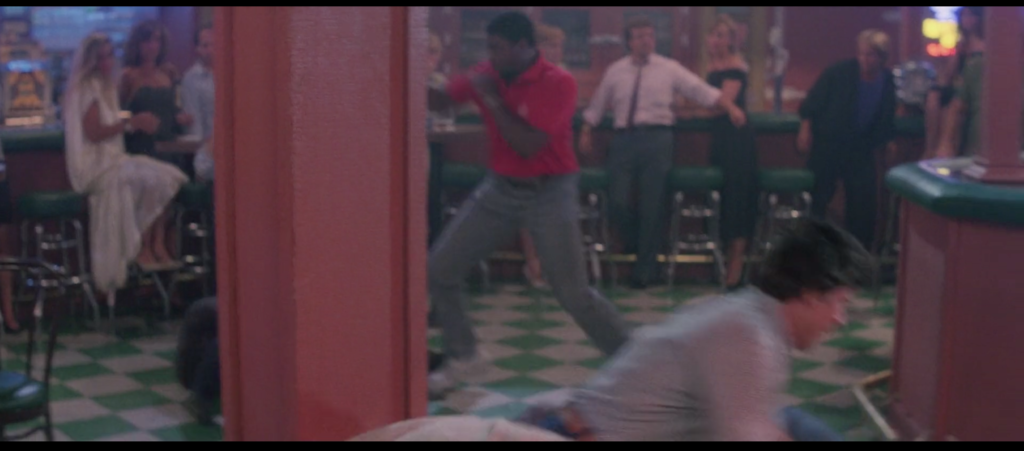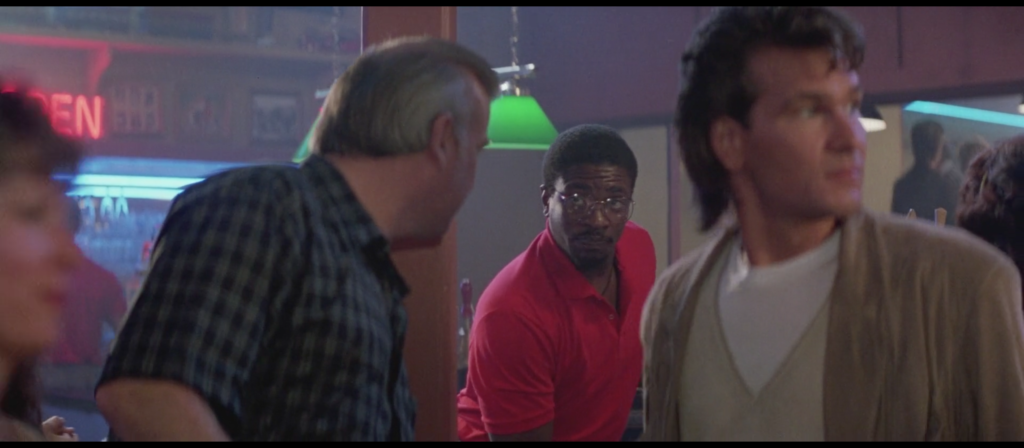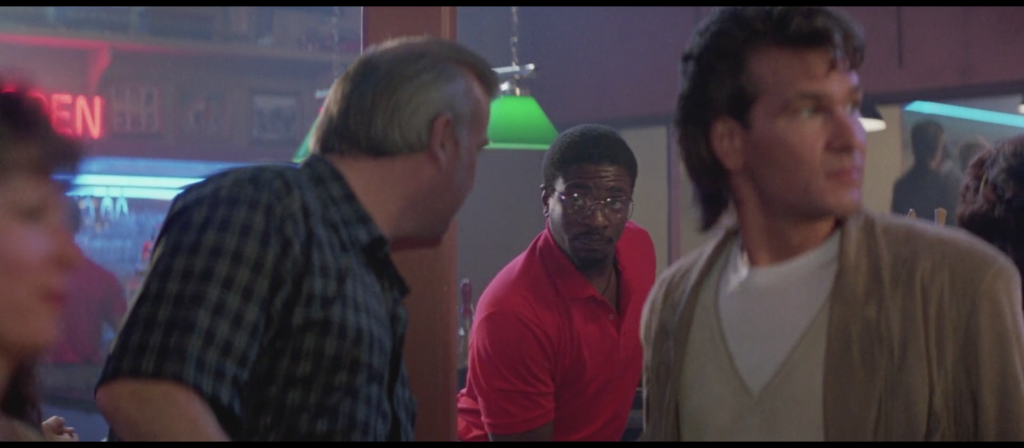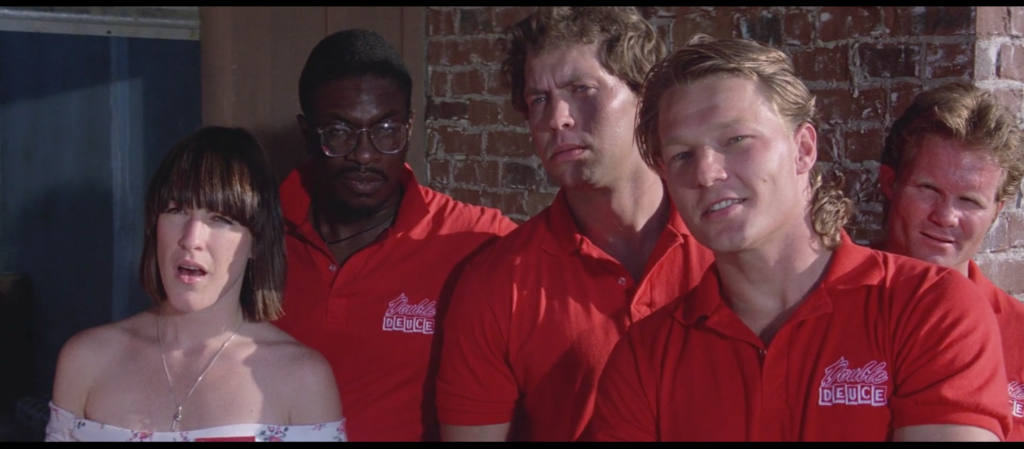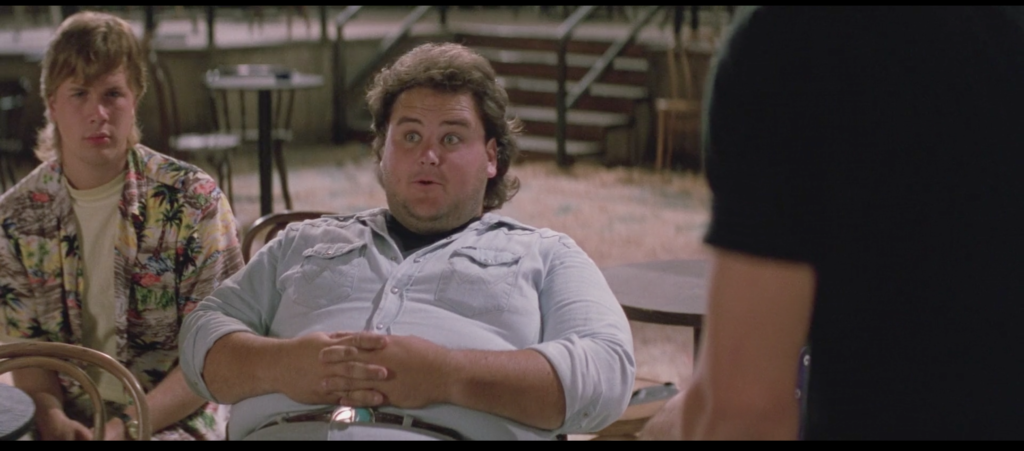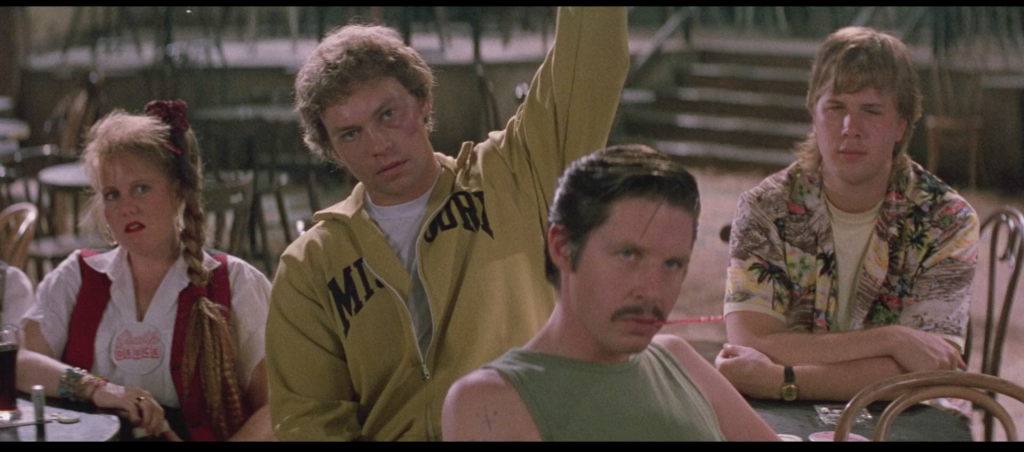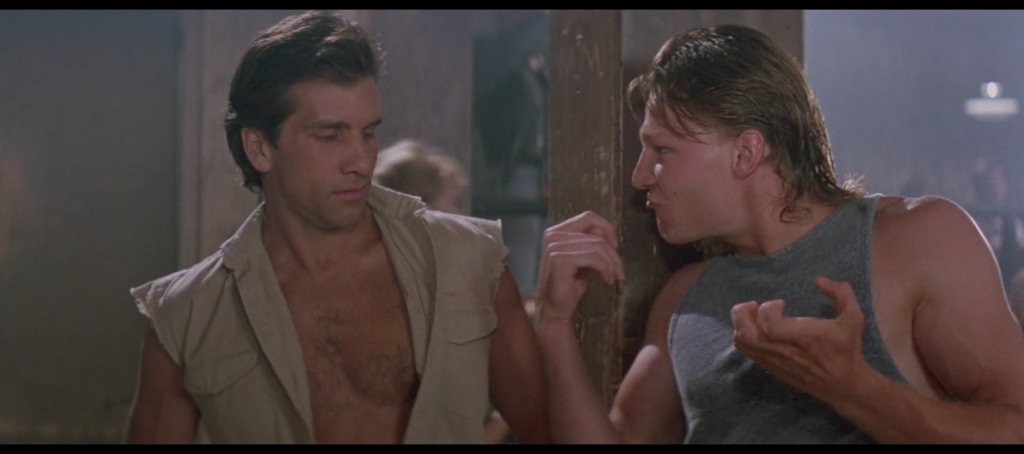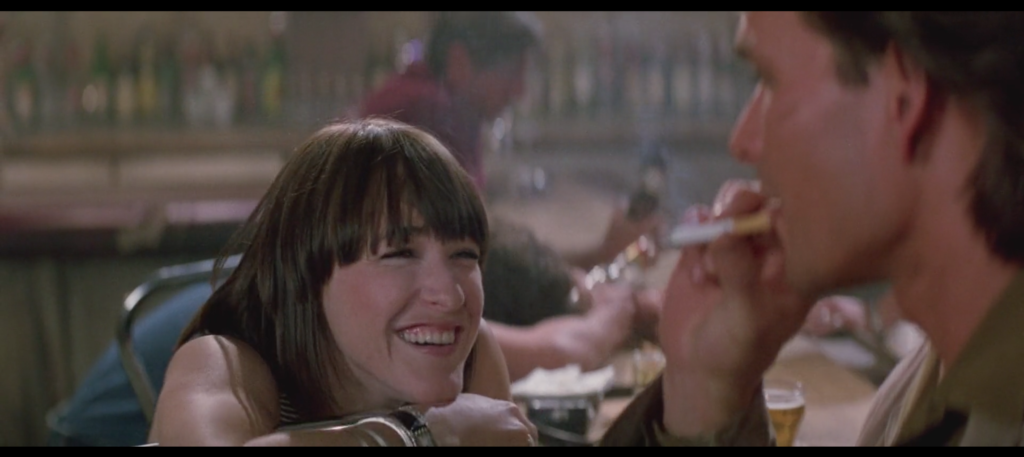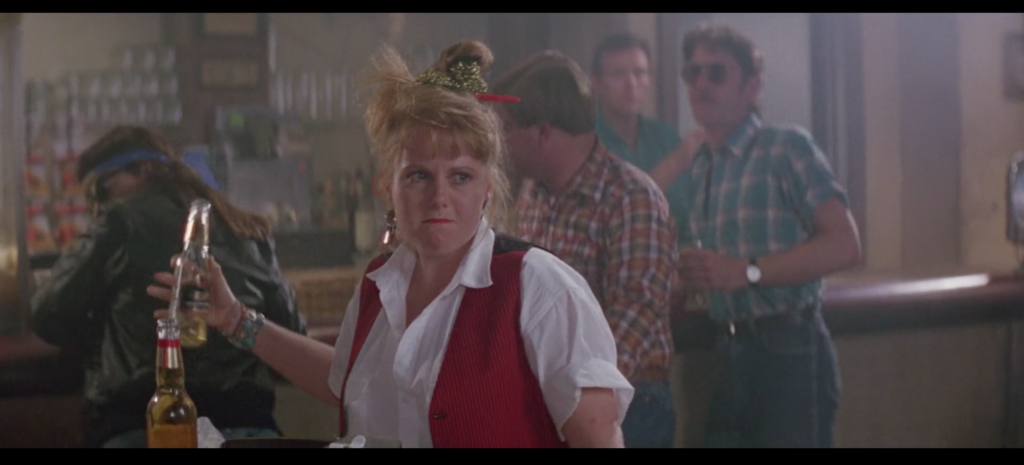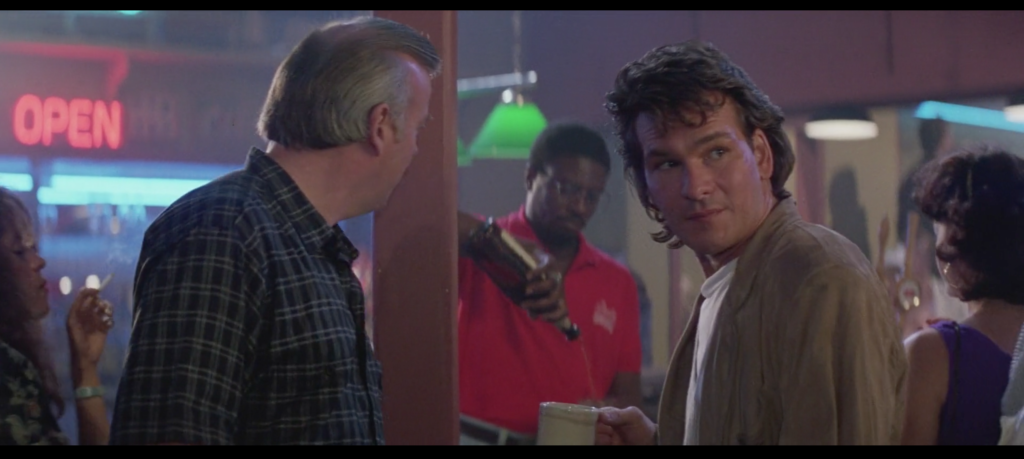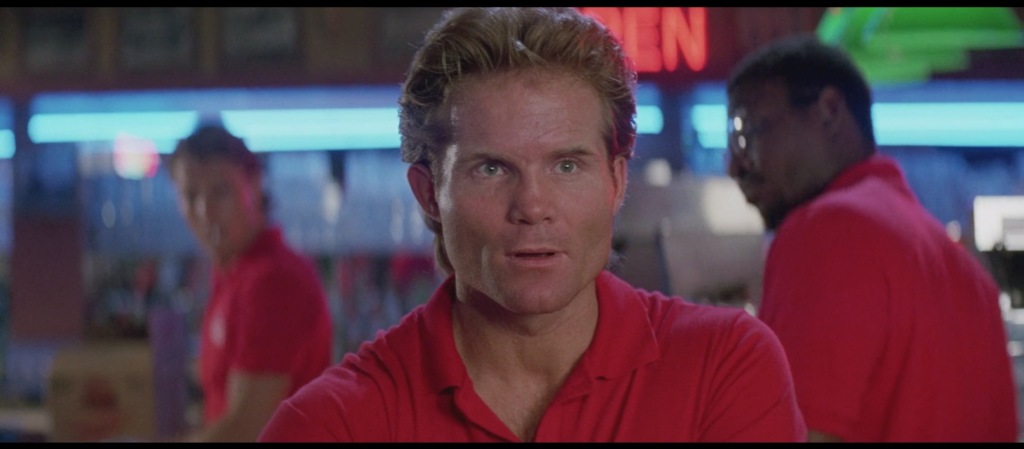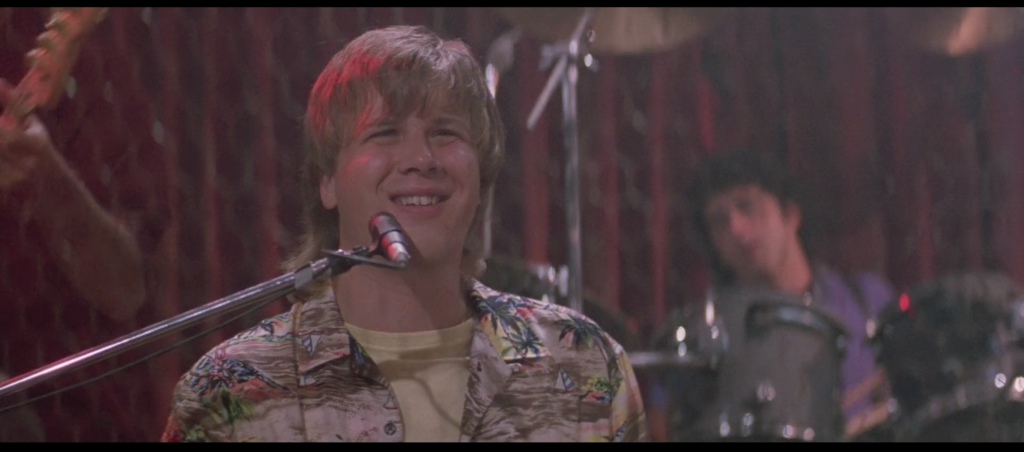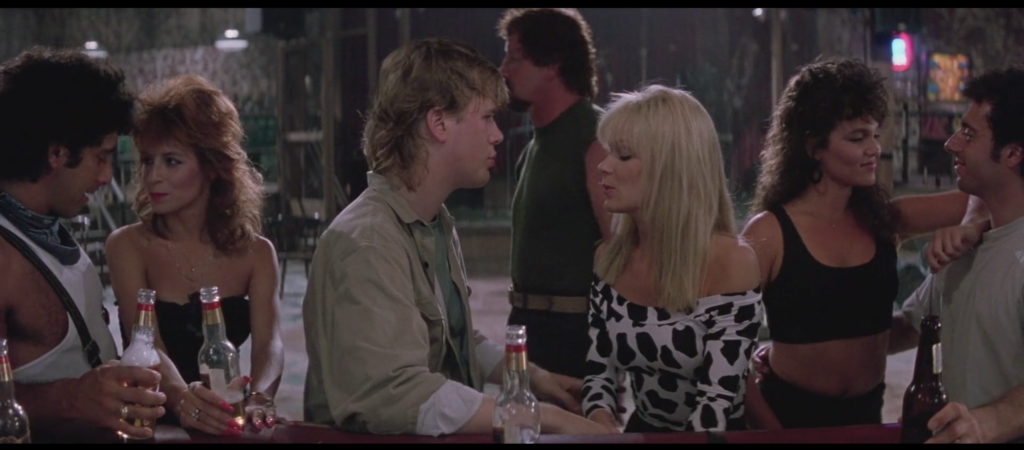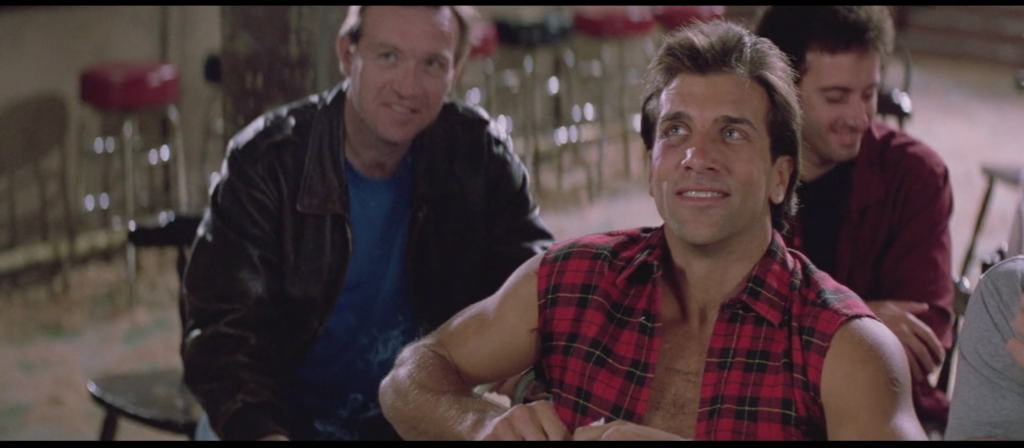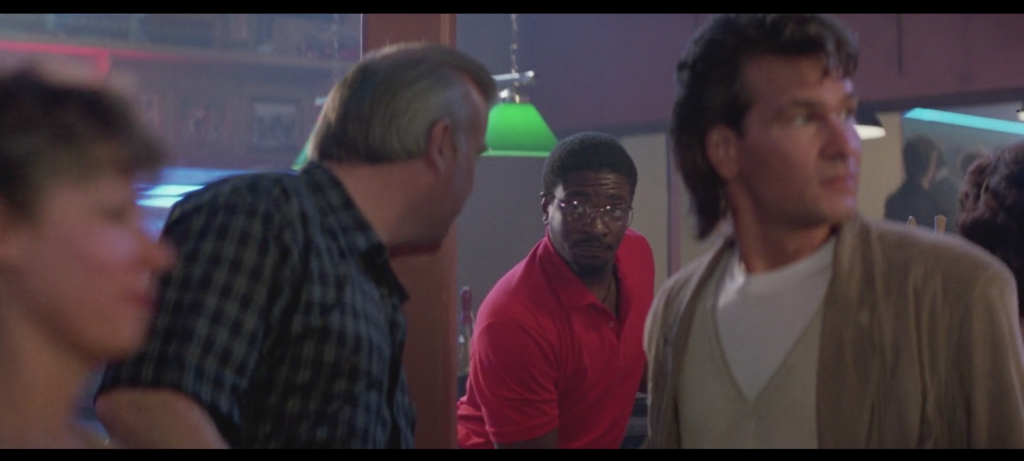Posts Tagged ‘ernie bass’
257. Ernie inaction -> Ernie in action
September 14, 2019You’re not supposed to see Keith David throw a punch in Road House. His part was all but excised from the film due to running-time concerns. His sole line of dialogue is to warn Tilghman that the whiskey’s running low. He’s one of the great action stars of the ’80s and the most action you see from him is handing Dalton a phone.
But soft! What light from yonder barroom breaks? While Dalton is polishing off one of the many cut-rate Brad Wesley goons—about whom more later—who infiltrated the Double Deuce during Red Webster’s fire alongside the usual suspects, there in the background, his fists obscured by a pillar, is one Ernie Bass, bartender-warrior, throwing hands with some dimp with a mustache and a dress shirt with no tie. Not the most formidable opponent, perhaps, not even in a world that contains O’Connor. But who knows what chaos the butterfly effect could have caused had the character played by Keith David not stepped into that particular breach?
And what about O’Connor and Tinker and Ketcham and Morgan, the traditional goons who accompanied Brad Wesley to the bar on this fateful night? Jack, Hank, and Younger don’t take care of them; they’re all too busy getting smacked in the skull with a pool cue by Jimmy. Wade Garrett doesn’t take care of them; he fights lesser goons until he’s summoned to a one-on-one bout with Jimmy in which he is badly outclassed. (It breaks your heart to see, truly it does.) Dalton doesn’t take care of them; he too is to busy fighting goonlets to do so, and then he intervenes in the Jimmy/Wade fight just before Brad Wesley calls the whole thing off.
There’s every reason to believe that while our attention is elsewhere—as indeed it is even in the few frames where Ernie is visibly fighting, our eyes drawn to the foreground action involving Dalton and a chibi-goon—Ernie wrecks shop, clearing out Wesley’s Slab Four all on his own. Keith David vs. Terry Funk…ah, what might have been. Our imaginations must fill the gap.
248. RELEASE THE KEITH DAVID CUT
September 5, 2019I have to ask you about Road House. You’re one of the first credited actors on the film and originally had a much bigger role. What happened?
Road House was great. Road House got me into my new car and it moved me into a new apartment. It was a four-week job that turned into 11 weeks. I had a great role. I got to fight with Terry Funk and a couple of other guys. I had a really good time. The day after the wrap party, [the director] Rowdy Herrington called me. He said, “Keith, I’ve got three and a half hours of movie that I’ve got to cut down to 2:15, so I’m sorry, buddy, but you’ve got to go.”What was your reaction?
What do you say? I’m like, “Oh, shit, okay.”At least you got your car and your apartment.
Not only that, but I got fifth billing on a single card. And I still get residuals. I also got to meet Sam Elliott, who I admired greatly. We got to do another movie [2001’s Pretty When You Cry] years later.
Well, we now have a definitive explanation for The Tragedy of Ernie Bass. But it’s one that raises more questions than it answers. Okay, Keith David’s character was cut for time. This much we can accept. But director Rowdy Herrington told him “I’ve got three and a half hours of movie.” Where is that extra hour and fifteen minutes now? If The Wicker Man can be pieced together from reels scattered across two continents, if Nightbreed can be resurrected after the Universal Backlot Fire and two decades of neglect, then by GOD we can get a full three and a half hour version of Road House. We deserve it. Keith David deserves it. The world deserves it.
192. ‘Whiskey’s Running Low’: The Tragedy of Keith David in ‘Road House’
July 11, 2019The man in the red shirt is Keith David. You may remember him from his roles in John Carpenter’s The Thing and They Live, two of the best science fiction and horror films ever made. In each he plays the main foil to the protagonists—rough-hewn salt-of-the-earth working-class white-guy types, with tough-as-nails attitudes and impressive heads of brown hair, who find themselves unexpectedly drawn into conflict with forces larger than themselves. Road House, you’ll note, stars Patrick Swayze as a rough-hewn salt-of-the-earth working-class white-guy type, with a tough-as-nails attitude and an impressive head of brown hair, who finds himself unexpectedly drawn into conflict with a force larger than himself.
Naturally, in Road House, Keith David plays a bartender whose sole line of dialogue is “Whiskey’s running low.”
That’s not quite all there is to the role. His name, uttered by both Tilghman and Dalton in this scene, is Ernie, and getting named is an honor precious few supporting characters in this film enjoy. He’s mentioned by name more than all the other bouncers and bartenders and waitresses still employed by the Double Deuce at this point in the film combined, save for Carrie Ann, who says her own name and gets it yelled at her by Pat McGurn. Everyone else? Bupkis.
What’s more, he’s listed with a surname in the closing credits. This too is more than can be said for virtually anyone in the movie. Jimmy, for example, went by “Jimmy Reno” during filming—you can find interview clips with Patrick Swayze in which he calls that character by name, it comes up frequently in interviews with actor Marshall Teague, and it’s in the IMDb listing—but is merely “Jimmy” in every official respect. Dalton himself only gets a mononym unless you inspect his medical file.
Most strikingly, Keith David appears in the opening credits. He’s billed fifth, after only Patrick Swayze, Ben Gazzara, Kelly Lynch, and Kevin Tighe, and just before Kathleen Wilhoite. The actors who play Emmett, Red, and Denise all get lumped together in a single triple chyron, which is fair enough. Sam Elliott gets a “And SAM ELLIOTT” to conclude the cast listing, which is appropriate. Jeff Healey slides in later on via an “Featured Music Performance by The Jeff Healey Band” slug. Other characters you think might reasonably get listed up front—Jimmy, Tinker, O’Connor, Ketchum, Morgan, Pat, Jack—aren’t there at all. Ernie’s fellow bartender, who’s there since the beginning, is entirely uncredited.
If you’ve watched David deftly dance between antagonist, supporting character, and stealth protagonist in The Thing, or if you’ve watched his world-building alley fight with “Rowdy” Roddy Piper in They Live, you probably have some questions about all this. God knows I do.
As best I can ascertain, partially from half-remembered poorly sourced comments in various Road House posts across the internet, and partially based on my own conjecture, is that Ernie Bass was originally a much more prominent character, the bulk of whose storyline wound up on the cutting room floor. I suspect he was a famous bartender, whom Dalton brought in to elevate the Double Deuce’s standing further still—surrounding himself with a surrogate family of old friends which also included Cody, his bandmates, and Wade Garrett. While the material was cut for time, contractual obligations kept David in the picture and in the credits.
A questionable decision, to be sure. Were David cast in a fighting role he’d be an invaluable asset to the film, and even as simply a gnomic presence dispensing basso profundo wisdom behind the bar he’d be a huge get. Instead? He hands Dalton a coffee with a nod of acknowledgement. He tells Tilghman “Whiskey’s running low.” He hands Dalton a phone. He looks at Wade Garrett. He looks at Wade and Dalton together. Exit Ernie Bass, pursued by an editor.
019. Staff
January 19, 2019Brad Wesley isn’t the only man in Jasper, Missouri with a goontourage. The employees of the Double Deuce whom Dalton does not fire when he assumes the role of cooler can generally be counted upon to have his back. I don’t think this is just the dubious whipped-dog loyalty of working stiffs to the middle manager who spares their jobs while shitcanning other people instead, either, though god knows we’ve all been there. Dalton brings out the best in good people and the worst in bad people. He’s a moral refinery. Here are the people who emerge purified from the kiln of his character. Most go unnamed, but let us not allow them to go unsung.
Jack
Bouncer. Expressive eyes. Quick on his feet, literally and figuratively. Played by Travis McKenna, whose body type sets him up as the opposite number to Brad Wesley goon standout Tinker, but never used as comic relief (except maybe once, when Brad Wesley goon standout Jimmy uses his prone body as a fulcrum to pole-vault onto the stage at the Double Deuce with a pool cue) and shows much higher levels of emotional intelligence. Fastest-moving character in the film save for Dalton himself. Visibly receptive to Dalton’s advice and instructions. Demonstratively appreciative of his fellow employees’ talents (he’s positively delighted to discover Carrie Ann’s singing voice). Frequently is the first to warn Dalton of Brad Wesley’s bad acts. Most likely to become the Dalton to Dalton’s Wade Garrett sometime down the line. Steve the Horny Bouncer whom Dalton fires due to his regular Saturday night thing calls him “Bear.” No one ever says this character’s name in the movie.
Younger
Bouncer. Just a big ol’ mumble-mouthed meathead, played by Roger Hewlett. Politely raises hand to ask a question during Dalton’s orientation session. Has the least screentime of the three bouncers, leaving the nature of his skill set largely to the imagination. The guy I would least like to tangle with personally, as he seems like he might not notice he’d beaten you to death until long after it was too late. No one ever says this character’s name in the movie.
Hank
Bouncer. The most visually dashing of Dalton’s crew, and the most openly fanboyish about his renowned exploits. Reenacts Dalton’s infamous throat-ripping maneuver, alerting us to this chapter in his checkered past. Frequently takes point in breaking up hostilities prior to Dalton stepping in. Smokes a lot. Played by future real-life murder-suicide perpetrator Kurt James Stefka, because every Lost Highway needs a fucking Robert Blake. No one ever says this character’s name in the movie.
Carrie Ann
Waitress. Singer. Breakfast delivery person. Engine of pure erotic power. Pal and confidante. Just a kickass character in every way. It helps that people do say her name in the movie, that’s for sure. Played by Kathleen Wilhoite and god bless her for it.
Stella
Waitress. Has that weird “German schoolgirl” vibe (description courtesy of MST3K/RiffTrax genius Mike Nelson) common to waitress types circa the filming of the original run of Twin Peaks, which you could probably convince anyone she was a character in as well. Tosses a bottle and hits a nitwit at one point. Played by Lauri Crossman. No one ever says this character’s name in the movie.
Ernie Bass
Bartender. Keith David. Unrealized potential. For some reason people say his name in the movie, though considering how badly he’s wasted who knows why.
The Nameless Bartender
Bartender. Prominent throughout the film. An original employee of the Double Deuce, unlike Ernie, who is brought in when things are flush. Multiple lines of dialogue. No one ever says this character’s name in the movie. No one ever bothered to name this character for the movie. Played by James McIntire, uncredited. There’s gotta be a story here, man.
Cody
Lead singer and guitarist of the Jeff Healey Band. Played by Jeff Healey. Not named Jeff Healey in the movie, though. Plays pretty good for a blind white boy, according to Dalton, with whom he has a long-standing working relationship. Possibly the person who recommended Dalton to Frank Tilghman, though this is never established and neither man seemed to realize the other would be working at the Double Deuce at the time of Dalton’s arrival. Adds much-needed verisimilitude and is a lot of fun to watch and listen to, even if acting is not Jeff Healey’s first calling. Recently I discovered that it’s Cody, not Dalton’s landlord Emmet, who sits on the shore as Dalton and the Doc skinny dip in that water at the end of the movie. They did seem pretty close, certainly.
Cody’s Drummer and Cody’s Bass Player
Drummer and bass player of the Jeff Healey Band. Played by Tom Stephen and Joe Rockman, who are amazingly not related despite both looking like they rolled off the dollar-store Eric Bogosian assembly line in the same batch. Silent observers of the events of the film, a mute Greek chorus. Great hair. No one ever says these characters’ names in the movie, not even “hey, Cody’s Drummer” or “Congrats on the chickenwire coming down, Cody’s Bass Player.”
???
??? That’s him on the left. I don’t know who this man is. This man is in a grand total of one scene, Dalton’s orientation session. This implies he’s an employee of the Double Deuce, but he is never seen before or since. No one ever says this character’s name in the movie. No one ever says his name outside of the movie. No record exists of the actor who played him. No evidence of his existence can be found anywhere beyond these few minutes of footage. Where he’s from the birds sing a pretty song, and there’s always music in the air. LET’S ROCK
018. Keith David
January 18, 2019This is Keith David. In 1982, he played Childs in John Carpenter’s The Thing. Childs is the primary antagonist for the main character, R.J. MacReady, played by Kurt Russell. I mean, everyone is everyone’s antagonist, but Childs is the person who’s the most openly suspicious of MacReady and hostile to the way he sort of naturally slides into a command position. It’s too much to say the two men must learn to work together to have any hope of defeating the shape-shifting alien that has infiltrated their remote Antarctic outpost, since there’s no learning involved, but they must work together, that’s for sure. The extent to which they do or don’t is, in the end, the final question asked by the film. David plays the character like a pot of water set to boil at any moment; his chemistry with the less demonstrative but no less gruff and argumentative MacReady is considerable, and essential to the success of the movie, which is one of the greatest horror and science-fiction films ever made.
In 1988, David reunited with carpenter for They Live, in which he played Frank. Frank is the primary antagonist for the main character, Nada, played by “Rowdy” Roddy Piper. Again, everyone is everyone’s antagonist in this film, another stone sci-fi/horror classic about distrust and paranoia in a world where alien invaders can look just like you and me. Beneath the anti-consumerist, anti-capitalist, anti-cop, anti-corporate-media agitprop for which it has become justly famous, They Live takes The Thing‘s survival-horror cabin-fever claustrophobia and simply expands it outward, until the entire planet is the remote outpost on which the last sane men and women are trapped. Having slipped on a specially treated pair of sunglasses that enable him to see the true faces of the alien overlords and the mind-numbing subliminal messages they’ve implanted in every TV screen, billboard, and printed page, Nada is one such sane man, but he can’t fight back alone. He needs Frank, a guy even bigger and tougher than himself whom he met while they made just-above-starvation wages at a construction site, to put on the sunglasses and see for himself, so they can join forces and fight the real enemy. Frank, understandably, thinks Nada is out of his mind. The only way he’ll wear the damn glasses is if he is beaten up badly enough to literally be unable to stop Nada from putting them on his head. This is what happens, during an ugly, sloppy, seemingly endless one-on-one brawl in an alleyway that lasts for six full minutes. It’s just Roddy Piper and Keith David whaling on each other, over and over, for roughly the length of “Hey Jude.” In the end, Frank is made to see the truth, and the two combatants become allies. It’s one of the greatest fight scenes ever filmed.
In 1989, David joined director Rowdy Herrington and star Patrick Swayze for Road House, a film that is to men punching other men in the face and torso what the children’s book series Clifford the Big Red Dog is to big red dogs named Clifford, in which he plays Ernie Bass. Ernie is not a bouncer. Ernie is a bartender. He says “Whiskey’s running low.” I think maybe he says hello to Dalton at some point but I’m not sure. He does not fight anyone, at all, ever. Not one punch. Not even a raised voice. Who knows, though. Maybe he helps guard Jasper, Missouri from the forces of evil by Dalton’s side after the end credits roll. It’s possible, anyway. Why don’t we just wait here for a little while. See what happens.

